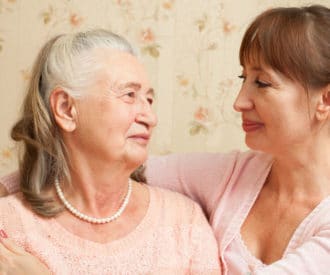It’s tough to brush someone else’s teeth
It’s essential for good dental health and overall health to make sure your older adult regularly brushes their teeth.
But when someone has Alzheimer’s disease or dementia, they might need help to brush their teeth properly to avoid cavities and other dental issues.
Unfortunately, very few people are willing to sit quietly and allow someone else to stick things in their mouth. Think of how you’d react if someone tried that on you.
So it’s understandable if your older adult resists when you try to brush their teeth – it’s human instinct.
To help you keep their teeth clean and mouth healthy, try dementia expert Teepa Snow’s 3 key techniques to get the job done with a minimum of fuss.
In this 2 minute video clip, Teepa demonstrates how to successfully brush someone else’s teeth by calming and distracting those natural instincts to resist.
Dementia care expert shares insightful tips
Teepa Snow is a leading expert in dementia care.
She has impressive credentials and when you watch her videos, it’s clear that she has a deep understanding of how to help people who have Alzheimer’s or dementia.
3 key tips for successfully brushing someone’s teeth
Teepa Snow’s 3 key techniques to help brush teeth:
- Stand on their dominant side – for example, stand on the person’s right side if they’re right-handed
- You hold the toothbrush, but they hold your hand that’s holding the brush. You’re controlling the motions, but since their hand is there, their brain thinks they’re doing the brushing on their own.
- Put your hand on the dominant side shoulder and apply gentle downward pressure while brushing. This takes their attention away from what’s happening in their mouth.
While she’s demonstrating, Teepa explains why these techniques help you successfully brush someone else’s teeth.
She also shows the natural reactions that happen when you don’t use her techniques.
Those natural reactions are probably what you’ve been up against if you’ve previously tried helping someone brush their teeth by taking over.
Next Step Use Teepa’s 3 techniques to help your older adult with dementia brush their teeth (2 min)
Recommended for you:
- 6 Positive Ways to Approach Someone with Dementia
- Therapeutic Fibbing: Why Experts Recommend Lying to Someone with Dementia
- 10 Ways to Respond to Dementia Hallucinations in Seniors
By DailyCaring Editorial Team





Anonymous
Maybe make spitting fun? You could squirt some gel or a little silly string in different spots in the sink bowl and award points spitting near one.
DailyCaring
Excellent idea! Making a little game out of it provides some fun and incentive 🙂
Anonymous
How do you brush the teeth of a Dementia person who bites the toothbrush and has forgotten how to spit outhouse the toothpaste?
My mom swallows the toothpaste and bites the toothbrush😊. Therefore I am unable to clean her teeth or her breath. She swallows the mouth wash as well.
DailyCaring
That’s a great question and a tough situation that will need some creative experimenting.
For the toothpaste, it may be safer to use a smaller amount (like a grain of rice) and to switch to a children’s toothpaste that’s meant to be swallowed in small amounts without harm. Mouthwash may be too difficult at this point. Plain water may be better for rinsing because it’s safe if swallowed.
It may help to demonstrate the tooth brushing on yourself in an exaggerated way so she can easily see how it’s done. For example, point to yourself, then open your mouth wide and show her your exaggerated brushing movements while your mouth is open. Then, point to her so she knows it’s her turn. Open your mouth to show what she should do and point to her. If there’s another person there, you could demonstrate brushing their teeth (just a little) to show that you’re brushing everyone’s teeth so it’s “”normal”” that you do hers. When brushing her teeth (assuming you can get that far), you may need to do it in sections to make it more comfortable. It can be tiring or uncomfortable to hold the mouth open for too long. Often, showing/demonstrating works much better than telling since it’s processed differently by the brain. It’s easier to copy someone’s actions.
I also found a couple of products that might help. Toothette swabs could be used instead of a toothbrush (hopefully she won’t bite them) — http://amzn.to/2EML7OO
Dip the swab into this solution to wipe the surface of teeth, gums, and inside the mouth — http://amzn.to/2ontwTm
It seems like Perox-a-Mint is used in hospital and similar settings and is safe when someone can no longer rinse or spit. Here are some reviews for the same product, one is from someone using it on someone with Alzheimer’s (this is an old/discontinued product link) — http://amzn.to/2FqQhNq
If she’s not likely to bite your finger, you could try wrapping a thin cloth around a finger (with a tiny bit of toothpaste on it) and gently scrubbing at her teeth.
This may also be a phase that will hopefully pass soon. I hope some of these solutions will help.